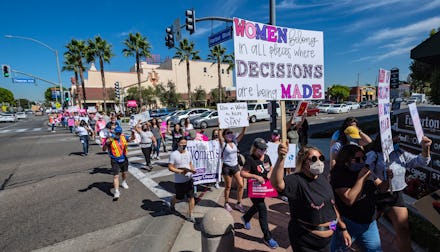This is what an abortion “sanctuary” state would look like
With Roe in jeopardy, California could be the first state to cover people's pre- and post-abortion expenses.

After last week’s oral arguments, it seems fairly inevitable that the majority of conservative justices on the Supreme Court will gut — if not overturn entirely — Roe v. Wade, the landmark case that enshrined a person’s right to reproductive health care, including abortions. If and when that happens, the nation will see a massive schism between states that allow abortions, and those that criminalize reproductive choice. Already there are dozens of states poised to make abortions illegal on day one after the court invalidates Roe, while the party currently in power in Washington seems ill-equipped to do anything about it on the federal level.
With that depressingly plausible future looming over us, the fight to protect reproductive health care rests in no small part on lawmakers at the state level, where some Democrats have already begun exploring ways to turn their communities into abortion “sanctuaries” should the necessity arise.
In California, those explorations have yielded a robust slate of recommendations, compiled by health care providers and lawmakers working together to ensure the state remains a hub of “reproductive freedom,” as mandated by Gov. Gavin Newsom this past September. The just-released “Recommendations to Protect, Strengthen, and Expand Abortion Services in California” document, created by a consortium of more than 40 abortion rights group dubbed the California Future of Abortion coalition, offers 45 legislative, executive, and administrative acts which would, the group claims, ensure “that California is a state where the rights of patients seeking abortion care, and those who support them, are protected.”
Many of the items recommended by the council are fairly straightforward: lowering barriers to access, diversifying the reproductive health care workforce to boost access for marginalized communities, strengthening legal protections for both patients and providers. But nestled within the dozens of recommendations are a number of legitimately progressive ideas, including using state funds for “direct logistical and practical support for patients such as gas, lodging, transportation, child care, doula support, food, lost wages, etc.” — in other words, directly helping those seeking abortions travel to, stay during, and recover from their procedures. What’s more, the document makes clear these policies are designed with not only Californians in mind, noting that “as more patients come from out of state, abortion fund organizations and providers that offer practical support will strain more than ever to meet the demand of people needing care.”
While the council itself is a non-legislative entity, that doesn’t mean its recommendations will be simply ignored by lawmakers. The recommendations document is introduced with a letter from California state Sen. Toni G. Atkins, the California Senate president pro Tempore, and is likely to be included — at least in part — in Newsom’s upcoming state budget.
“We’ll be a sanctuary,” Newsom told the Associated Press last week. “We are looking at ways to support that inevitability [of patients traveling from out of state] and looking at ways to expand our protections.”
While the recommendation document doesn’t include a specific price tag for the group’s suggestions, California — the nation’s top economy, and the fifth largest on the planet — has enjoyed massive budget surpluses in recent years, with a predicted $31 billion in extra funds expected after 2021. What’s more, should California succeed in establishing itself as a sanctuary for reproductive health care, it will not only be protecting abortion rights within its own borders, but will have also created a template for other states to follow — which is all part of the California Future of Abortion coalition’s plans. As is written in the document’s introductory statement: “We hope that the [California Future of Abortion] Council’s work and California’s effort to implement these recommendations will serve as a model for other states as well as the federal government.”